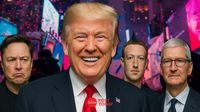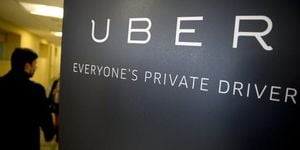TikTok, a popular social media platform from China, is gearing up to enter the online shopping market in Japan within the next few months. This expansion comes after its recent launches in Italy, France, and Germany, where TikTok Shop was introduced in March. The move signals TikTok's ambitions to broaden its business horizons beyond the United States, especially as its future in the American market remains uncertain.
Reports from Japanese media, citing anonymous sources, indicate that TikTok is actively recruiting sales staff for its TikTok Shop in Japan. This strategy is part of a larger effort to solidify its presence in the global e-commerce landscape. The company faces scrutiny from both U.S. and European regulators, particularly concerning data security practices linked to its Chinese ownership.
Former President Donald Trump has been vocal about his concerns regarding TikTok's data handling, which raises questions about the platform's compliance with privacy standards. Trump has suggested that the fate of TikTok in the U.S. might hinge on stricter regulations or even financial penalties, which could complicate the app's operations. His administration had previously extended deadlines regarding TikTok's potential sale of U.S. operations, reflecting ongoing negotiations that have yet to yield a definitive outcome.
As Trump navigates the complexities of his relationship with Big Tech, he is likely to influence the regulatory landscape significantly. Observers note that his administration's approach to technology firms could create new partnerships or impose stricter compliance requirements, impacting business strategies across the sector.
Darrell West, a senior analyst at the Brookings Institution's Center for Technology Innovation, noted that technology companies may be "easier to figure out" than they were in the past. This suggests that Trump could re-enter the regulatory arena with a clearer strategy, potentially reshaping how these companies operate in the U.S.
In the past, Trump has maintained relationships with various tech CEOs, some of whom have benefited from his policies. For instance, Jensen Huang, CEO of Nvidia, has seen his company thrive under government programs, reportedly generating around $1 billion. Similarly, Sam Altman, CEO of OpenAI, has also capitalized on government contracts, reflecting a broader trend where tech firms align closely with political leadership.
Despite the potential for collaboration, the relationship between Trump and tech leaders can be volatile. For example, while he initially fostered connections with executives from major companies, policy shifts have led to significant market fluctuations. Reports indicate that stock prices for major tech firms, including those in the S&P 500 and Nasdaq Composite, have experienced declines since Trump's presidency began.
Elon Musk, the CEO of Tesla and SpaceX, is another prominent figure in the tech landscape who has invested heavily in Trump's political endeavors, contributing over $277 million during the election cycle. However, public sentiment appears to be shifting, with some Americans expressing discontent over Musk's political involvement. In a recent earnings call, Musk indicated a desire to reduce his political engagement to focus more on Tesla, which has faced declining sales.
Mark Zuckerberg, founder of Meta (formerly Facebook), has also had a tumultuous relationship with Trump. Zuckerberg has attempted to mend ties with the former president, even referring to him as "great" prior to the election. Meta has faced legal challenges from the Federal Trade Commission (FTC), which is pushing for the company to divest Instagram and WhatsApp, citing anti-competitive practices. This legal scrutiny could further complicate Zuckerberg's efforts to maintain a favorable relationship with Trump.
Meanwhile, Sundar Pichai, CEO of Alphabet, has navigated his own challenges. Google, which is part of Alphabet, has faced antitrust investigations, and Pichai has met with Trump in the past to discuss regulatory issues. Despite these challenges, Alphabet reported higher-than-expected earnings in its latest quarterly report, indicating resilience amid market volatility.
In contrast, some tech executives have opted for a more cautious approach. For instance, Satya Nadella, CEO of Microsoft, congratulated Trump online but did not attend the inauguration. Microsoft has also benefited from government contracts, generating substantial revenue through its partnerships.
As TikTok prepares to launch its shopping platform in Japan, the company must navigate a complex web of regulatory concerns and competitive pressures. The success of TikTok Shop could depend on how well the platform addresses data security issues while appealing to Japanese consumers. The stakes are high, as TikTok seeks to establish itself as a formidable player in the e-commerce sector.
Looking ahead, the interplay between TikTok's expansion and the regulatory environment shaped by Trump will be crucial. As the former president continues to influence tech policies, companies like TikTok may find themselves adapting to new challenges and opportunities in the marketplace. The evolving relationship between tech giants and political leadership will undoubtedly shape the future landscape of the industry.




